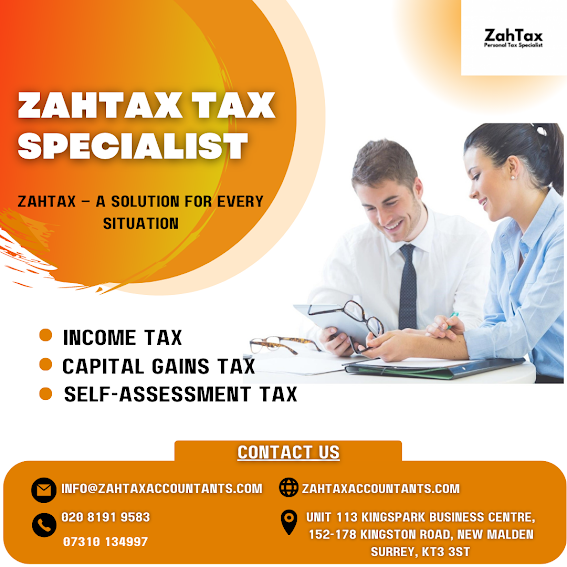Why Landlords Should Hire a Tax Return Accountant
Being a landlord comes with a unique set of challenges, and one of the most important aspects of managing your rental properties is understanding the tax implications. Whether you're renting out a single property or managing a large portfolio of properties, it's essential to have a solid understanding of how to report rental income and maximize deductions. That's why it's important to work with a specialized landlord tax return accountant who can help you navigate the complex tax code and make informed financial decisions.
In this post, we'll discuss the various tax challenges faced by landlords and explain why it's so important to work with a specialized tax return accountant. We'll also provide tips on how to find the right accountant for your needs and share best practices for working effectively with your accountant.
Overview of Tax Challenges Faced by Landlords
The tax code related to rental income can be complex and confusing, even for experienced landlords. Some of the most significant challenges landlords face include:
Depreciation and Deductions:
Landlords are entitled to deduct many of the expenses associated with owning and maintaining rental properties. These can include property taxes, mortgage interest, repairs, maintenance, and depreciation. However, calculating and claiming these deductions can be complicated and requires a thorough understanding of tax laws.
Rental Income Reporting:
Rental income must be reported to the IRS, and landlords are required to file a Schedule E with their tax return. This form requires landlords to report all rental income received during the year, as well as any expenses related to the rental property. Reporting this information accurately is crucial, as failure to do so can result in penalties and fines.
Tax Implications of Property Sales:
If a landlord decides to sell a rental property, there are several tax implications to consider. For example, landlords may be subject to capital gains taxes on the sale of the property, which can be complex to calculate. Working with an experienced tax return accountant can help landlords understand these tax implications and make informed decisions about selling their properties.
The Benefits of Hiring a Tax Return Accountant
While some landlords may attempt to navigate the tax code on their own, there are many benefits to working with a specialized tax return accountant. Here are just a few of the advantages of working with a professional:
Maximizing Deductions:
A specialized tax return accountant can help landlords identify all of the deductions they are entitled to and ensure that they are claiming them correctly. This can help landlords save money on their taxes and maximize their profits.
Professional Tax Advice: Landlords who work with a tax return accountant have access to professional tax advice and expertise. These professionals stay up-to-date with changes to the tax code and can provide guidance on how to structure rental properties and manage taxes for maximum benefit.
Accurate Rental Income Reporting:
Accurately reporting rental income is crucial to avoiding penalties and fines from the IRS. A specialized tax return accountant can ensure that all income and expenses are reported correctly and that landlords are in compliance with all tax laws.
Expertise in Navigating Tax Code:
The tax code related to rental income is complex and ever-changing. A specialized tax return accountant has the expertise and knowledge to navigate these laws and ensure that landlords are taking advantage of all available deductions.
Avoiding Costly Mistakes:
Mistakes on tax returns can be costly, both in terms of penalties and missed deductions. By working with a specialized tax return accountant, landlords can avoid these mistakes and ensure that their tax returns are accurate and complete.
When it comes to finding a tax return accountant landlord have several options. Here are three types of accountants that landlords can work with:
Certified Public Accountants (CPAs):
CPAs are licensed professionals who have passed a rigorous exam and meet strict education and experience requirements. They can provide a wide range of accounting and tax services, including tax return preparation, financial planning, and auditing. Many CPAs specialize in working with specific industries or types of clients, such as landlords.
Enrolled Agents (EAs):
EAs are tax professionals who are licensed by the IRS. They have passed a comprehensive exam and must complete continuing education requirements to maintain their license. EAs are experts in tax law and can provide tax planning, preparation, and representation services.
Tax Attorneys:
Tax attorneys are lawyers who specialize in tax law. They can provide legal advice and representation related to tax issues, including rental property taxes. Tax attorneys can be helpful for landlords who are dealing with complex tax issues or who are facing an audit or other legal challenge.
How to Find the Right Accountant for Your Needs
Finding the right tax return accountant is an important decision that can impact your financial health and success as a landlord. Here are some tips on how to find the right accountant for your needs:
Do Your Research:
Start by researching potential accountants online, reading reviews and testimonials, and checking their credentials. Look for accountants who have experience working with landlords and who have a solid reputation in the industry.
Interview Potential Candidates: Set up a consultation with potential accountants to discuss your needs and ask questions about their experience and services. This can help you get a feel for their approach and expertise and determine if they are a good fit for your needs.
Consider Cost:
While cost should not be the only factor in your decision, it's important to consider the cost of working with an accountant and ensure that it fits within your budget. Some accountants may charge a flat fee, while others may charge hourly rates.
Best Practices for Working Effectively with Your Accountant.
Once you've found the right tax return accountant for your needs, it's important to work effectively with them to get the most value from their services. Here are some best practices for working with your accountant:
Be Organized:
Keep accurate records of all income and expenses related to your rental properties and provide these records to your accountant in a timely manner. This can help ensure that your tax returns are accurate and complete.
Communicate Clearly: Be clear and concise when communicating with your accountant about your needs and expectations. Provide all relevant information and ask questions if you need clarification or guidance.
Follow Up:
Stay in touch with your accountant throughout the year and follow up on any action items or recommendations they provide. This can help ensure that you stay on top of your tax obligations and maximize your deductions.
Conclusion
Managing rental properties can be a complex and challenging endeavor, especially when it comes to understanding and managing taxes. By working with a specialized tax return accountant, landlords can ensure that they are in compliance with all tax laws, maximize deductions, and make informed financial decisions. Whether you're a new landlord or an experienced property manager, finding the right tax return accountant is an essential step in managing your rental properties effectively and achieving financial success.
Author Bio
ZahTax Accountants is a team of experienced and qualified accountants who specialize in providing tax services to landlords and property managers. With over 25 years of experience in the industry, we have the expertise and knowledge to help you navigate the complex tax code and make informed financial decisions. Contact us today to learn more about how we can help you achieve your financial goals.



Comments
Post a Comment